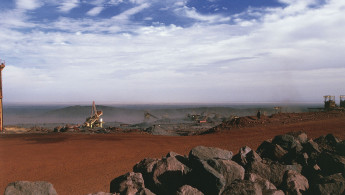Workers assert power in Mauritania mine strike
Fatima is concerned about her finances after she went on strike with her son. Eight other members of the family are unemployed.
The elderly woman, like thousands of other workers from the National Industrial and Mining Company (NIMC), has not been paid since she downed tools in February.
This is a clear violation of an agreement signed by the state-owned company and its workers.
The strike was called in the mining town of Zouerat with workers demanding better treatment by the company.
"I refuse to work under difficult conditions resulting from poverty and oppression caused by the company's administration. Just like the Mauritanian government, [NIMC] is against the rights of the workers," said Ould al-Salek, a striking worker.
Mohammed Ahmed Ould al-Salek, the secretary of the General Confederation of Mauritanian Workers (CGTM), says the roots in the crisis arose after the company reneged on an earlier agreement with workers in May 2014.
In it, SNIM agreed to pay a three-month salary for the miners for 2013 plus additional production bonuses and overtime.
"The company's failure to comply with the terms of the agreement signed with the labourers and its continued rejection of their demands were the reason behind their strike," Salek says.
"Exports from the port of Nouadhibou have completely ceased, which is the economic hub of the country. This pushed the company to call some retirees and interns to cover for the labourers who went on strike."
SNIM admit that these inexperienced workers have damaged machinery.
The miners say the Mauritanian government and SNIM rejected talks about their rights that unions insist are covered by local and international labour laws.
This provoked them into action, they say.
| Exports from the port of Nouadhibou have completely ceased. - Mohammed Ahmed Ould al-Salek, union leader |
Government responsible
Salek holds the Mauritanian president, Ould Abdel Aziz, responsible for the crisis.
"Whenever the labourers tried to initiate a serious dialogue with the government, their efforts would be rejected by President Aziz, according to the company’s director," the union leader says.
Recent remarks by the minister of petroleum, energy and mines during a meeting with union leaders in Nouadhibou, also highlighted the government’s reluctance to meet the workers' demands.
Siden Ould Sayid Mohammad, the head of SNIM's coordination committee, admits that the 56 day strike has nearly brought iron ore production to a complete halt.
The mineral is one of Mauritania's main sources of income, and has the potential to cause major economic problems for the country.
"The company suffered huge losses because the advanced machines were operated by non-specialists, especially in the iron-rich Guelb Rhein mine," he adds.
He says that partly due to this, the company is making not profits.
Production declines
"If we assume that the factory's capacity is 200,000 tonnes, its current output is as low as 20,000 or 30,000 tonnes. The factory is therefore losing money," he said.
Documents obtained by al-Araby al-Jadeed show that SNIM saw a 73 percent decline in iron production after the strike.
In early January, the factory's production was 170,910 tonnes and declined to 47,380 tonnes in February when the workers began their action.
Iron ore production then dropped to 20,570 tonnes when more miners in Mauritania joined the strike.
Factories that were once operated by three working teams now have only two on duty.
The strike, say workers, appears to be successful. Despite minimal results from the Nouadhibou meeting, workers say it is a sign that the company is listening to their demands.
As the economic situation for the country and company get worse, it could push them into a solution.
"The company's administration expressed its desire to resolve the crisis by talking with the workers," said one worker speaking anonymously.
Realising that the workers now hold the power, the union leaders insist they will not negotiate on their demands.
So long as the company refuses to honour its earlier agreement, the workers say that the pits will remain closed and the cargo ships empty.
This is an edited translation from our Arabic edition.



